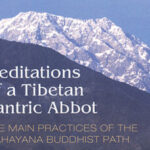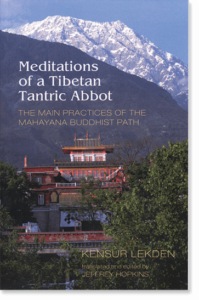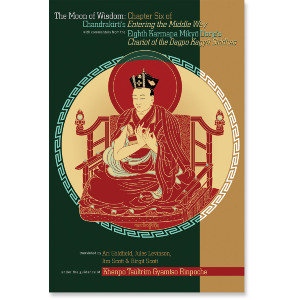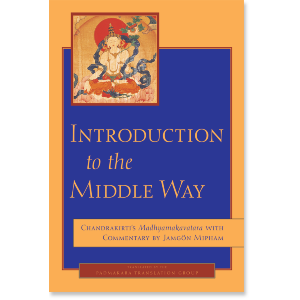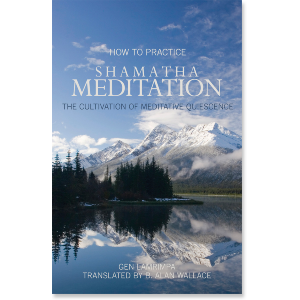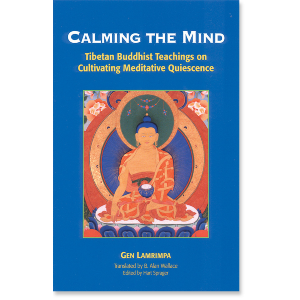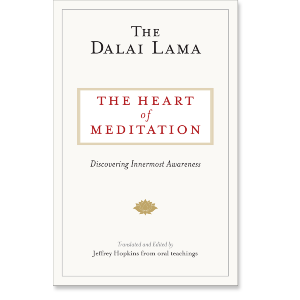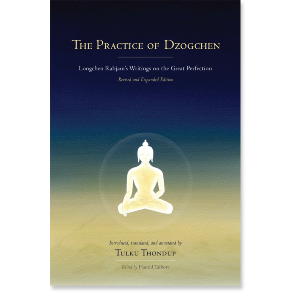| The following article is from the Spring, 2001 issue of the Snow Lion Newsletter and is for historical reference only. You can see this in context of the original newsletter here. |
The Main Practices of
the Mahayana Buddhist Path
by Kensur Lekden translated by Jeffrey Hopkins
This books presents with the intimate freshness of a personal teaching, the main practices of the Mahayana Buddhist path. It details the attitudes cultivated in meditation ranging from turning away from cyclic existence, to developing love and compassion for all beings, to the profound view of emptiness.
This is still about the best introduction available on the central topics of compassion and wisdom and, most especially, the philosophical and meditative synergy between them.
-Prof. Anne Klein
Love
Here is an excerpt from the first chapter, entitled Love.
I want to offer good luck and happiness to all of you who have assembled here today.
Because all humans are doers of deeds, the Buddhist system of practice has an explanation of how to act. You do deeds by identifying that which is to be practiced or taken in hand and that which is to be forsaken or discarded. The best of what is to be adopted is effort at the means of causing everyone to possess happiness and to be free from suffering. With respect to adopting the means of causing everyone, yourself and others, to possess happiness, there are three actions to be done: hearing, thinking, and meditating.
Hearing means that you yourself hear the explanation of another or look in a book and discover what is to be done in order to obtain happiness. What will you discover with respect to possessing happiness?
First you need to have the body of a human or a god. That body must be healthy and free from pain. Also, you must have the resources, clothing, food, shelter and so forth of a human or a god. You must have a long life and be able to achieve what you seek.
Since we need these, what do we do in order to get them? To obtain the body of a human or a god in the next birth, you must, during this lifetime, abandon the ten non-virtues and you must maintain the ten virtues. Having the body and resources of a god or a human is called high status; the lower types of cyclic existence are hell beings, hungry ghosts, and animals.
The main cause of high status within cyclic existence within the round of birth, aging, sickness and death is good ethics. Chandrakirti says in his Supplement to (Nagarjuna's) Treatise on the Middle, Other than ethics, there is no cause of high status. Therefore all of us living here in this world, in a former life whenever it was kept any of the ten virtues, and in dependence on that, we attained our present body and resources.
Can you determine whether your future life will be good or not?
In determining whether our future lives will be good or not, we should analyze whether our minds are presently adopting the practices that will bring about happiness. Our teacher, Shakyamuni Buddha, said, To determine what you did in the past, examine your present body. To determine what will exist in the future, examine your present mind. To determine whether or not your future will be good, you should analyze the mode of behavior of your mind. The life that we have now is an effect of what we did in the past.
The cause of the arising of excellent resources happiness and comfort is the giving of gifts. You should not steal, you should not be miserly. Also, so that in future lives there will not be a great deal of fighting, so that you will not be punished, so that disturbances of yourself and others will not arise, you need to cultivate patience in this lifetime.
Since in the future life you need good education and knowledge of how to act, in this lifetime you must make great effort at study at giving up what is to be abandoned and at assuming what is to be adopted. Then, in order that in future lives your mind will not be distracted, in this lifetime you must cultivate meditative stabilization, samadhi, and set your mind one-pointedly.
In your next lifetime you need to be intelligent and know what is to be adopted and what is to be discarded and in order to do that, in this lifetime you need to train in the wisdom knowing what is suitable and unsuitable and in the wisdom knowing what exists. You should engage in study and training.
If the causes of happiness are achieved, the effect is happiness. Those causes of happiness are giving, ethics, patience, effort, concentration, and wisdom. If in this life you engage in the causes of happiness the six perfections, the ten virtues, and so forth then in a future lifetime the effect will definitely appear; happiness definitely will arise.
It is necessary for you to form an understanding of the practice of hearing, of what hearing is and of what is to be heard. Then all the factors of thinking must be discovered in detail. Thinking means that you develop a conviction; for instance, you come to the decision that for the arising of happiness, the causes of happiness and virtue must be achieved.
Because you need to obtain the happy effects and the causes producing them, and because it is necessary for yourself and others to attain them, you must meditate. In this world there were nihilists who said that one should not meditate, doing only those activities that will bring about marvelous happiness, comfort, and prosperity in this lifetime. The nihilists said that one should gather possessions and clothing, and if one's body is sick, one should take medicine, that these activities were justified, but that nothing else was needed. Such a philosophy appeared in the world and with respect to it there is this Buddhist teaching: You need a job for your livelihood, you need to work for the sake of your country, for the sake of yourself and others, to set up factories, to plant fields; still you should act mainly for the sake of your future life, because you will not always remain in this lifetime. All persons will definitely die, and the time of death is indefinite. At the time of death, nothing helps except religious practice. This is how it is. Therefore, even though you need happiness and comfort in this life and even though it is necessary to strive for the sake of food and drink now, this lifetime is short. Our longest condition of life is our countless future lives. If you consider only this which you can see now and you do not consider all the future lives which you cannot see, you will incur immeasurable fault. You will harm yourself.
What are the reasons for this? This life will definitely end. There is not even a single person in the world who will remain without dying. At the time of death not even your parents, who have been very kind to you, will go with you. You must go alone. Even if you have family, children, brothers, sisters, friends good friends not even one of them can be taken along with you. It is like taking a hair out of butter; you must leave your own body as well as the place where you were lying down and go alone. Therefore you must act mainly for the welfare of future lives.
The wealth we have accumulated in this life, we cannot carry with us. The friends whom we have arranged around us, we cannot take with us. We cannot lead people with us, servants and so forth. What can be carried with us? We take with us only the predispositions of our actions; for this reason we must establish beneficial predispositions through accumulating virtues which are the causes of happiness in the future. Therefore we must hear, think, and meditate in this lifetime for the sake of future lifetimes.
If you do not accomplish the causes of happiness in this lifetime, you will not have anything at all to carry with you at the time of death. If you have accumulated non-virtues, predispositions will have been established in your mind for the arising of suffering. If you have accumulated virtues, you will have predispositions in your mind that give rise to happiness. It is like the body and its odor. Wherever the body goes, the odor goes with it. Just so, wherever the person goes, these causes which are the accumulations of virtue and non-virtue go with him or her. Therefore, in this lifetime hearing must be done, and if through thinking understanding develops, meditation which achieves happiness and the causes of happiness must be performed.
You should cultivate this thought in meditation, May happiness and the causes of happiness come to be possessed. Such meditation is of two types: meditation for your own welfare and meditation for other's welfare. If you cultivate in meditation the thought, May I possess happiness and the causes of happiness in the next and all succeeding lifetimes, there is only a little benefit. How do you meditate so that there is great benefit? You meditate taking cognizance of the welfare of all sentient beings, thinking, May all sentient beings throughout all of space, illustrated by my kind parents of this lifetime, possess happiness and the causes of happiness. If this meditation is done, the benefit is limitless, equal to space itself.
Our teacher, Shakyamuni Buddha, said, To determine what you did in the past, examine your present body. To determine what will exist in the future, examine your present mind.
What example is there for the benefit? In the word of Buddha, it is said that if a sesame seed is squeezed, only a little bit of oil comes out, but if many are squeezed, a huge barrel can be filled with the oil. Even if you meditate only once for only five minutes taking cognizance of all sentient beings, thinking, May all sentient beings throughout space and illustrated by my kind parents of this lifetime have happiness and the causes of happiness, then, even though there is only a little bit of help with respect to each sentient being and even though you meditate for only five minutes, because the scope is so vast, the virtue is inconceivable. If virtue had form, it would not fit in the whole world system. Virtue, however, is not physical; it is a product that is neither form nor consciousness. Virtues are latent predispositions abiding in the continuum of the mind.
Just as a little oil is taken from a single sesame seed, so with many it is possible to fill a pot with oil. In the same way, since sentient beings are limitless, if you meditate for the welfare of others, using this great field of awareness, wishing, May all sentient beings have happiness and the causes of happiness, the benefit from that one time is immeasurably great because it establishes very beneficial predispositions in the continuum of the mind.
Within our own country, do we not act lovingly toward our own children, our own friends? In just the same measure we are to act lovingly toward all sentient beings throughout all of space. Even if someone acts like an enemy toward us, we are to cultivate love toward that person. We should cultivate love not only when someone acts well toward us, but also when someone acts badly or in a middling manner toward us. To all of them we are one-pointedly, equally, to cultivate love.
The chief of all those activities you should assume is the cultivation of love the wish that all sentient beings have happiness and the causes of happiness. This helps you in the future; in addition, you should do whatever should be done in your own country. To say, I am doing religious practice, and not act in the service of your country is totally wrong.
Even if you die tomorrow or the day after tomorrow, you should meditate and study today. Why is this? Sakya Pandita said that even if one is soon to die, one should learn the sciences, that though one will not become wise in this lifetime, one is certain to in the next birth. Thus, even if you are to die tomorrow, you should study, learn, and meditate today.
There are many facets to meditation. You identify the causes of happiness, the ten virtues, the six perfections giving, ethics, patience, effort, concentration, and wisdom and then cultivate the wish that all sentient beings have these causes of happiness and happiness itself lives as gods and humans, resources, comfort, and so forth.
How can meditative posture help your meditation?
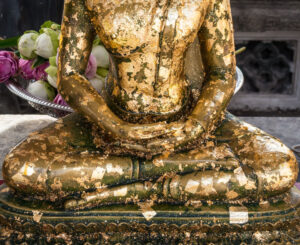
Using the posture of the Buddha Vairochana, the adamantine (lotus) or the half-adamantine posture
In an actual session of practice you need to assume a meditative posture and set the mind one-pointedly without distraction on the object of meditation. You should assume the sitting posture of the Buddha Vairochana, the adamantine (lotus) or the half-adamantine posture. Your eyes are not to look greatly upward nor are they to be shut, but are to be set evenly. If, except for looking at the point of the nose, you look to the right or to the left, the mind will be distracted. Your backbone must be straight, without bending backward or forward or to the right or to the left. Your shoulders must be set straight without bending this way or that. Your head must be set naturally without being arched back or without being bent forward; your nose should be in line with your navel. Your lips and your teeth should be set naturally and freely, and your tongue should be set at the back of your upper teeth. Your exhalation and inhalation of breath should not be noisy and should not be done with difficulty, but softly and gently. Allow the breath soundlessly and effortlessly to move in and out without purposefully making it slower or faster.
How to place the hands in meditative equipoise or like that of Avalokiteshvara
There are many different ways to place the hands, and you should do whatever suits you. There is one way with the hands on top of one another, the right hand on top of the left and placed in the center of the lap, called the position of meditative equipoise. There is one way where the left hand is placed flat on the lap with the palm upward and the right hand extends over the right knee touching the ground. This is called the posture of meditative equipoise touching the earth. Another posture is like that of Avalokiteshvara, for the sake of resting; you set the palms of your hands flat on the ground at your sides. For those who are cramped, this is quite comfortable. In some postures, one holds a sword or a book in a hand, but the posture of meditative equipoise is easier. If you are a little uncomfortable, sit in the posture of rest. It is very comfortable.
How to set the mind one-pointedly without distraction
When it is time to meditate and your posture has been set correctly, considering one exhalation and one inhalation of breath as one unit, count your breaths until twenty-one. This will prevent your mind from being distracted elsewhere; it will prevent your ears hearing sounds, your eyes seeing forms, your nose smelling odors, your tongue perceiving tastes, your body feeling touches. These will not occur. The mind will thereby be set one-pointedly without distraction. Now you should call to mind your acquaintances of this lifetime and cultivate in meditation the thought, May all sentient beings have happiness and the causes of happiness. This meditation is called the cultivation of love because you are being loving and beneficial toward all beings.
Initially, this is not to be meditated too long, just for ten or fifteen minutes, then more and more by degrees. After you have meditated this way for months or years, you can make it longer and longer. It is not good to become completely tired.
Cultivate the wish that all sentient beings have the causes of happiness
Once you have cultivated the thought, May all sentient beings possess happiness and the causes of happiness, and this meditation has been done for many, many years, then eventually you will attain what is called immeasurable love. When you have attained immeasurable love, you have meditative stabilization, meditative equipoise, and calm abiding.
You should leave aside a suitable length of time for meditation and cultivate love every day, continuously. You can meditate just before going to bed or early in the morning when you rise. If you cultivate love little by little, very clearly, then since the field of awareness is all sentient beings, sending love to all of them, it is as if you are repaying the immeasurable kindness that they extended to you in former lifetimes. When you meditate for the sake of the welfare of others, your meditation is included within the activities of a being of greatest capacity from among the three types of beings: those of small, middling and great capacity.
Now let us break for a short period and when you return to meditate, assume the posture that I have described, begin the breathing exercise, and when about to meditate, take to mind your own father and mother of this lifetime, then make the aspiring prayer, May all sentient beings throughout all of space, as illustrated by my own father and mother, have happiness and the causes of happiness. When you are about to leave the meditation you should dedicate it, thinking, By the fruit of whatever virtue has arisen from the force of my hearing and thinking and meditating, may all beings be freed from cyclic existence and attain the state of a perfect Buddha Or, it is sufficient to say at the time of dedication, May whatever virtue there is in having cultivated the thought, May all sentient beings have happiness and the causes of happiness,' help everyone throughout space.
What fault is there if you do not make a dedication? Even if you meditate well every day, when a little hatred arises, when someone pushes you and you immediately become angry, it is said that these virtues are destroyed. In the commentaries on Buddha's word, it is said that the virtue accumulated over a thousand eons is destroyed with one moment of anger.
When Shakyamuni Buddha was residing in Bodhgaya, he told 2,250 Hearers, Anger destroys the roots of virtue. The Hearers thought, If so, there is not one among us who does not get angry; thus none of our roots of virtue have remained. In the future none will remain. Even if we do virtue, it cannot be amassed. They were very worried. They thought, If one moment of anger can destroy the virtues accumulated over a thousand eons, then since we get angry many times every day, we do not have any virtue.
When they related this to Buddha, he poured water into a little vessel and asked, Will this water remain without evaporating? Because India is very hot, the Hearers thought, In a few days the water will evaporate. This must mean that our virtue will not remain at all. They were extremely worried. Then Buddha asked, If this water is poured in the ocean, how long will it stay? It will remain until the ocean itself evaporates.
Therefore, if you do not just leave this virtue, but dedicate it, making a prayer petition that it become a cause of help and happiness for limitless sentient beings, then until that actually occurs, the virtue will not be lost. Like a small amount of water poured into the ocean, which will last until the ocean itself dries up, so the fruit of your virtue will remain until it has ripened. The benefit of hearing, thinking and meditating, in terms of causing all persons to possess happiness and the causes of happiness, is inconceivable, but if it is not dedicated, then when anger arises, it will be destroyed. This benefit cannot be seen with the eye, but it is inconceivable.
You are amazingly virtuous. I only think that it is wrong for me to sit above you. I should sit below you. It is wonderful that you feel motivated to hear about this practice and meditate and cultivate it in meditation.
Now, rest a little and then when you return to meditate, sit as was explained before, count the breath for twenty-one inhalations and exhalations, and meditate for about fifteen minutes. And when it is time to stop, dedicate it as follows: May whatever virtue there has been in my meditation and aspiration become a cause for happiness and comfort for all. Then you can rise and the meditation will be complete.

